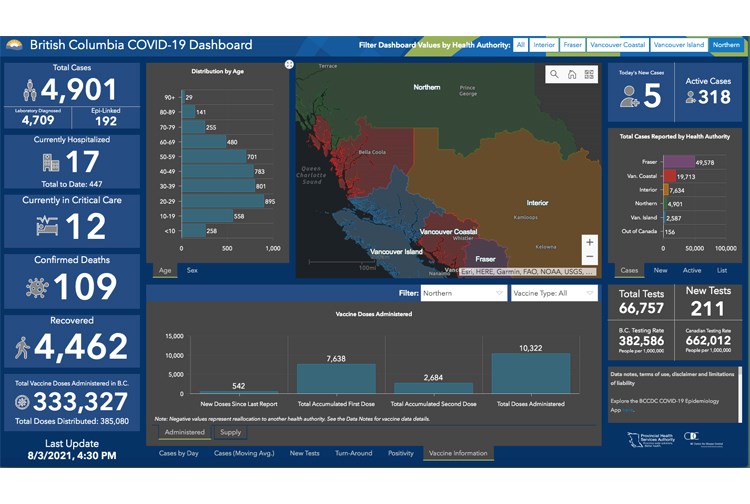The first doses of AstraZeneca's COVID-19 vaccine are expected to arrive in B.C. this week, and some may be earmarked to combat the ongoing outbreak in Prince Rupert.
On Monday provincial health officer Dr. Bonnie Henry implied the fridge-stable COVID vaccine may be used to vaccinate people in Prince Rupert and in large, high-risk workplaces in the province. However, as of Monday afternoon, a spokesperson for Northern Health wasn't able to confirm that the vaccine was headed to the port town in northwest B.C.
According to data released by the B.C. Centre for Disease Control, between Feb. 21 and Feb. 27, the Prince Rupert local health area had 73 new cases of COVID-19 – an infection rate higher than 20 per 100,000 population. By comparison, the Prince George local health area – which includes Mackenzie and Robson Valley – had 30 new cases during the same period, a rate of less than five cases per 100,000 people.
Also on Monday, Henry said her office will be looking at easing public health restrictions on a number of activities, including sports, religious services, visits to long-term care homes and regional travel.
"In the coming weeks, we hope to see a return of sports and religious services," Henry said. "We are working closely with faith leaders. We're looking at how these things can be done safely."
When asked if in-person church services would be allowed by Easter, Henry said "that's our goal." She also mentioned the upcoming celebrations of Passover, Ramadan and Vaisakhi.
However, she said, British Columbians shouldn't expect to see all restrictions lifted immediately or at once – the province's approach will be like "turning a dial" not "flipping a switch."
"Our layers of protection will still be needed, and still work," Henry said. "I still have concerns. We have a lot of transmission in our community. Right now it's happening in Prince Rupert, for example."
In addition to changes coming in the short term, schools offering Kindergarten and to Grade 12, and post-secondary institutions, should begin planning for classes to "look much more normal by September," Henry said.
"I fully expect we'll get to a post-pandemic way of looking at this by this summer," Henry said. "(But) if we do start seeing cases take off, then we will have to impose restrictions. But I don't want to have to do that."
COVID CASES UP, HOSPITALIZATIONS DOWN IN NORTH
The Northern Health region had 102 new cases of COVID-19 over the weekend, Henry said.
Data released by the B.C. CDC showed the number of active cases in the region rose from 294 on Friday to 318 on Monday. However the number of those hospitalized with COVID-19 dropped from 23 to 17 over the same period.
The number of COVID-19 patients in critical care in the north remained static at 12, and no new COVID-related deaths were reported since Friday. Eleven COVID-related deaths were reported in B.C. over the weekend, bringing the province's death toll from the pandemic up to 1,391 – including 109 in the Northern Health region.
Since the start of the pandemic a year ago, there have been 4,901 cases of COVID-19 reported in the north.
A total of 7,638 doses of COVID vaccine have been administered in northern B.C., including 2,684 second doses.
Monday was the first day British Columbians over the age of 90 – and Indigenous British Columbians over the age of 65 – could register for their appiontment to get a COVID-19 vaccine. See story.



